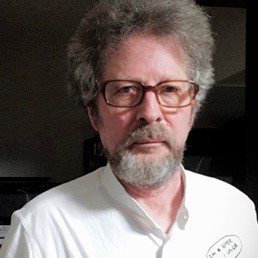
科学技術分野の翻訳者として成功するために必要なものとは――? ベテラン翻訳者・天河航さんの記事を、サイマルのWebマガジン『通訳・翻訳ブック』と公益社団法人日本工業英語協会※の情報誌『技術英語ジャーナル』にて特別公開! 科学技術への興味から始まった技術翻訳者への道のり、技術翻訳者としての心構えなど、サイマルの翻訳者による日本語訳とともにお送りします。
The Lifelong Road to Science and Technology Translation
When I was learning to read as a lad growing up in Michigan, the first book that caught my fancy was called Johnny’s Machines, about a farm boy who loved pushing buttons and operating gadgets. He was kept occupied by a growing array of increasingly complicated machines to tinker with. By the time I started school, I had read it many times over. When I was a bit older, my uncle, an engineer at an aircraft firm, introduced me to the world of electronics. I was soon building radios, audio gear, and a transmitter from which I broadcast music and talk programs to our neighborhood. It was only natural that I looked ahead to a science career. Excelling in mathematics and chemistry in high school, I entered university as a physics major.
Then something fateful happened. In university, I found the people studying liberal arts to be much more interesting than the rather boring science and math students. This was enough for me to switch over to an English major course, alongside a major in German. During and after university, I continued to study various languages, and eventually got around to learning Japanese.
I never lost my interest in gadgets, however. When the computer age arrived, I was quick to buy an early PC and learn programming. A long-time audiophile, I got my start as a translator in the field of audio equipment. Upon becoming a full-time translator, I initially worked on a range of topics from lightbulb manufacturing to semiconductors, then expanded into telecommunications and other large systems. Today much of my work is in industrial processes including metal fabrication, and in environmental technology.
The reality we face as technical translators is that science and technology are constantly changing. We can prepare ourselves with a basic understanding of mathematics and science, and how things work; but we also have to keep learning, to stay up to date with the state of the art. In the telecommunications field, for example, I became a specialist in a new switching technology, translating thousands of pages on it, only to have the technology go out of date, replaced by an entirely different approach. One way to cope with this diversity is to narrow your work to a few companies and become thoroughly familiar with their technologies, expanding your knowledge incrementally as new advances are made.
Before the internet, research on new technologies meant spending hours in bookstores and libraries. Today we have a vast amount of information just a few keystrokes away. All of us develop our own techniques for utilizing this vast store of information; but the better we become at this skill, the more effective we will be as translators.
Given the nature of the job, what do I suggest for those looking at a career in technical translation?
Start by taking a hard look at the qualities you bring to the task. Being comfortable with technology is of course a must, but by itself is not enough. Engineers and researchers are often poor at explaining their work to others. My fellow math and physics students in university, the ones who drove me away and into the liberal arts, no doubt went on to become good engineers, but not necessarily good science communicators.
People who are good at writing are likely to have been avid book readers all their lives. Translation, after all, is as much about good writing as it is about foreign language skills. Mastery of the target language is essential, but takes long years of practice to develop fully.
What about foreign language skills? Are they not the most important? While it may surprise many to hear this, language ability may actually be the least difficult to acquire of the necessary skills set. Today we live in a global society where we readily come into contact with people of different cultures. We also have a wealth of language-learning tools at our disposal. There was a time when Japanese mastery by foreigners was looked upon with awe; but today, the number of non-natives who are fluent in Japanese is much larger than it was even 20 or 30 years ago. Mastery of writing, on the other hand, is just as elusive today as it was half a century ago, if not more so.
Of the various skills necessary for success as a science and technology translator, then, I believe love of technology, love of language, and meticulous writing skills are all important; but perhaps the last is the most crucial of them all, and the hardest to come by. The role of good writing in technical translation, however, is not to entertain, not to obfuscate, but to clarify. Becoming a good writer, one who can convey the arcane matters of science and technology clearly, is like mastering a musical instrument. Above all else, this is the skill you must devote your life to acquiring.
和訳:生涯続く科学技術翻訳への道
ミシガン州育ちの子どもだった私が読むことを覚え始めたとき、最初に気に入った本が『ジョン君の大好きな機械(Johnny’s Machines)』だった。ボタンを押したり機械を操作したりするのが大好きな田舎の少年の物語だ。主人公のジョン君は物語の中で、次々と目の前に現れる、複雑さを増していく機械を夢中でいじっていた。私は学校へ上がるまでに、この本を何度も繰り返し読んだ。少し大きくなったころ、航空機会社のエンジニアをしていた伯父がエレクトロニクスの世界を教えてくれた。私はすぐさまラジオやオーディオ機器、送信機を組み立てて、音楽番組やトーク番組を隣近所に向けて放送した。科学の道へ進むことを見据えるようになったのは当然の流れといえる。高校で数学と化学が得意だった私は、物理学専攻で大学に入学した。
その後、運命を左右する出来事が起きた。大学に通い始めてから、ややつまらない理数系の学生よりも、人文系の学生の方がはるかに面白い世界に生きていることがわかったのだ。これは英文科とドイツ語に専攻を切り替える動機として十分だった。私は在学中、そして卒業後もさまざまな言語の勉強を続け、ついには日本語を学ぶようになった。
しかし、機械への興味を失ったことは一度もない。コンピュータ時代が到来したときは、すぐに初期のパソコンを買ってプログラミングを学んだ。長年のオーディオマニアだった私は、その後オーディオ機器分野から翻訳のキャリアをスタートさせた。専業翻訳者になった当初より、電球の製造から半導体までさまざまなテーマの案件に取り組み、やがて通信などの大規模システムの翻訳を手掛けるようになった。現在は、主に金属加工をはじめとする工業プロセスや環境技術の分野の翻訳に従事している。
私たち技術翻訳者は、科学技術が絶えず変化し続けるという現実に直面している。数学や化学、物事の仕組みに関する基礎知識で備えることもできるが、それと同時に、勉強を続けて最先端技術を常に把握しておかなければならない。例えば、通信分野において、私はある新しい交換方式のスペシャリストとなり、何千ページもの関連資料を訳したが、その技術はやがて時代遅れになり、全く異なる方式に取って代わられた。こうした技術の移り変わりへの対処法の一つとして、クライアントを数社に絞り、その会社の技術を徹底的に理解した上で、新たな技術的進展が達成されるたびに徐々に自らの知識を広げていくという方法がある。
インターネットが登場する以前は、新しい技術のリサーチのために書店や図書館で長い時間を費やさなければならなかった。それが今では、パソコンのキーをほんの数回叩くだけで膨大な量の情報を手に入れることができる。私たちは皆、この膨大な情報を活用する独自の方法を生み出しているが、こうしたリサーチ力が上がれば上がるほど、翻訳者としてより効率的に仕事を進められるようになる。
この仕事の特性を踏まえた上で、技術翻訳の道に進みたいと考えている人に対して、私から何が提案できるか考えてみたい。
まず、技術翻訳に生かせる自らの資質をしっかりと見つめることから始めてほしい。技術に親しんでいることはもちろん必須だが、それだけでは十分ではない。エンジニアや研究者は自分の仕事や研究を人に説明するのが苦手なことが多い。私が人文系に転向するきっかけとなった数学や物理学専攻の同級生たちは、優れたエンジニアになったのは間違いないが、優れた科学コミュニケーターとは必ずしも言い切れない。
文章を書くのがうまい人たちは、子どもの頃から大の読書家であることが多い。翻訳ではやはり語学力と同じくらい文章力の高さがものを言う。ターゲット言語を使いこなす力が翻訳には不可欠だが、その力を十分に身につけるには長年の訓練が必要となる。
では、語学力についてはどうか。最も重要なものではないのだろうか。意外と、翻訳に必要なスキルのうち、実は語学力が最も習得しやすいものかもしれない。現在、私たちはグローバル社会に生き、異なる文化を持つ人たちと容易に触れ合うことができる。また、自由に使える語学学習ツールも豊富に揃っている。かつては外国人が日本語を使いこなすと畏敬のまなざしで見られたものだが、今日では日本語を流暢に話す外国人の数が20年前や30年前よりもはるかに増えている。だが一方で、書くことを含めてターゲット言語を自在に使いこなす力を持った人は、半世紀前に勝るとも劣らず、今でも珍しい。
科学技術分野の翻訳者として成功するために必要なさまざまなスキルのうち、技術への愛、言葉への愛、細部まで行き届いた文章を書く能力が何よりも重要だと私は思う。だが、おそらく最後に挙げた文章力がその中でも最も重要で、最も身につけるのが難しいだろう。しかし、技術翻訳において優れた文章が果たす役割は、楽しませることでも曖昧にすることでもなく、明確にすることである。科学技術の難解な内容を明確に伝えることができる優れた書き手になることは、楽器をマスターすることに似ている。文章力は何をおいても生涯をかけて習得しなければならないスキルなのだ。

米国生まれ。出版社にて11年間編集者のキャリアの後、サンフランシスコから日本へ。日英翻訳は1985年から現在まで。2005年に日本国籍を得た。
こちらの記事は『技術英語ジャ―ナル No.03 VOL.40 September - 2020』に掲載されたものと同内容です。
※公益社団法人日本工業英語協会は、2021年に日本技術英語協会に名称変更後、2022年、一般社団法人日本能率協会に吸収合併されました(2023年追記)
【ご案内】公益社団法人日本工業英語協会実施「技術英語能力検定(技術英検)」
【あわせて読みたい】特別コラボ企画Vol.2 技術翻訳の現状と今後
として働くなら
サイマルへ
サイマル・グループでは、世界との交流を共に支える通訳者・翻訳者を募集しています。あなたのキャリア設計や就業スタイルにあった働き方で、充実したサポート体制のもと、さらなる可能性を広げてみませんか。

